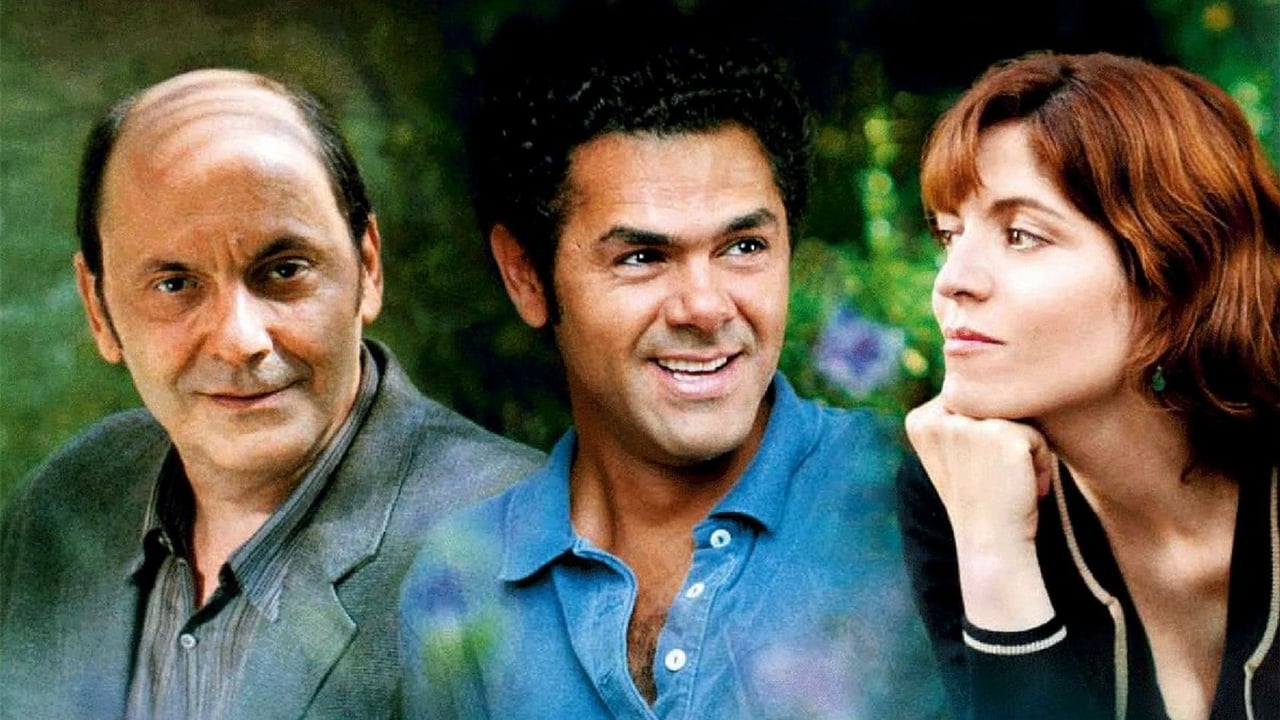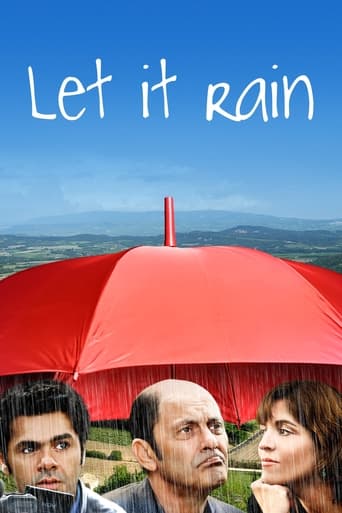

Who payed the critics
... View MoreLoad of rubbish!!
... View MoreIt's fun, it's light, [but] it has a hard time when its tries to get heavy.
... View MoreOne of the film's great tricks is that, for a time, you think it will go down a rabbit hole of unrealistic glorification.
... View MoreThis was a flat movie. It is, briefly, the story of two sisters, one an author/feminist who is considering going into politics, the other "just a sister," who seems just to sit at home with her boyfriend, who is sort of flat too. A has-been movie director convinces the would-be politician to sit for a series of interviews, which go poorly. In between we see a little of the director's life with his son - he is divorced and his ex has custody, so he doesn't see his son often. We see a little of the romantic/private life of the feminist, whose boyfriend feels like he has become unnecessary in her life and leaves her. We see that the two sisters evidently have some unresolved issues concerning their mother, who passed away the year before. The housekeeper also evidently has some issues with her ex, but they aren't explored either. Nothing really is, and yet this movie goes on for a long time, or so it seems.There is no real character development for any of the characters. The dialog is not interesting. The few shots of Provence are nothing special. The movie, in short, is nothing special.Flat.
... View MoreA lot of talk about the weather in the region of France where this story takes place, lead us to believe the film will a continuous deluge, but alas, most of the rain happens at the end of this tale about the making of a documentary that was not meant to be.Karim, a front desk clerk from a local hotel, and an aspiring film maker, decides to make a documentary about Agathe Villanova, a politician, to get her angle on a lot of subjects where her experience will prove well worth telling. For this project he enlists Michel Ronsard, who has directed his own documentaries. Their two man team could not be more different. Agathe's views on racism and sexism are what Karim is trying to capture as the essence for the film.Agathe, who has come to spend some time with her sister Florence in this part of the Provance, where the family lived. Agathe has come to help her sister sort out things after the death of their mother. What Agathe is not counting is her sister's resentment because she has gone to become somewhat notorious and a minor celebrity. Florence herself is involved with Michel in a secret liaison no one suspects. The family reunion turns out to be an occasion for rehashing the past.This has been one of the three films by its director, and star, Agnes Jaoui, we have found less involving. Basically, it is a rambling film that goes nowhere, nor does it solve any of the tensions between the two sisters, or even gets the documentary done because of the constant interruptions experienced in the shooting. Ms. Jaoui, who also acts in all her films, is an enigma in this one. What she has accomplish is making a better movie than it should have been in the way uses music to paraphrase each sequence, by her use of the excellent music selections that perhaps gives the viewer hope that what will follow will be better. There is a recurring motif sung by the King Singers of Schubert's "Der Goldenfahrer" that haunts the viewer's mind long after the film is over. Ms. Jaoui also selected music from Vivaldi, Nina Simone, and even a Cuban carnival ensemble that adds another layer to the picture.Jean-Pierre Bacri, the director's collaborator and former husband, makes a good case for Michel Rosand, a documentary maker that shows he has no clue in how to bring the project to the screen, or even has any affinity with the son he is supposed to be entertaining, but who begs to go away with a friend. Jamel Debbouze is seen as Karim. Pascalle Arbillot is Florence and Mimouna Hadji seems to be a natural in her take of the loyal servant."Parlez-moi de la pluie" is a mildly amusing comedy.
... View MoreLet's Talk About the Rain is about as exciting and entertaining as, well, talking about the rain. Such a discussion may warrant some interesting insights into the person you are communicating with and in turn you may learn a little about yourself, but it certainly wouldn't go on for two hours. In what would have been a much more concise and in turn, poignant project, director Agnès Jaoui makes a fine impression here but also shows a lack of restraint in her ability to know when to cut apart her work. It can be lightly amusing and uplifting, insightful and has character work that puts many of this year's features to shame, yet it also lacks any momentum, or motivation; main character Michel Ronsard would say they are the same thing, and Jaoui neglects both. In the end the director's feature comes off as an exceptional study of character but one devoid of any significance outside of its practice. From beginning to end the performances and writing establish that Let's Talk About the Rain is strictly an academic exercise in documenting. A fine piece of character study, but lacking any resounding message or clear intent, Jaoui succumbs to the astute pointlessness that too often dominates such directors' work.With little to no plot at all, Let's Talk About the Rain tells the paper thin story of a group of individuals loosely connected through family, friends and colleagues. The central figures of this collage come in the form of incompetent documentary film-maker Michel Ronsard (Jean-Pierre Bacri), his talented assistant Karim (Jamel Debbouze) and their subject; a successful politician and feminist Agathe Villanova (Agnès Jaoui). Using these characters and those around them Jaoui does well to tell an engaging story that slowly unravels the layers of dynamism between her personalities, whether it is through friendship, family, business or most importantly, love. Moving at a snail's pace from beginning to end, it's easy to get a little despondent when watching Let's Talk About the Rain go over its incessant need to analyse and document the mundane and largely inconsequential moments that these characters share, yet there are also plenty of scenes which carry with them much more finely focused intent. Such moments will usually establish the best parts of these characters through their ultimate bonding either through a smile or even a kiss, and it's here that Jaoui shows her real talent for creating resonating character drama. Unfortunately, with a plot that fails to drive anything forward, an abundance of inconsequential indulgences stops the feature from ever taking off.The strongest element of this exercise comes in the form of Jaoui and her fellow cast members who all share a nice sense of chemistry between each other, and do just as well on their own too. Jean-Pierre Bacri gets the most chuckles here, playing the bumbling but well-intentioned film-maker who is too often a slave to his eyes and those around him. Jamel Debbouze plays it close to many of his previous works, conveying the rather withdrawn but intelligent and gifted assistant to Bacri. As good as he works with Bacri however, it is his scenes with Florence Loiret (who plays as his love interest outside of a neglected marriage) that serve as key highlights, culminating in a sentimental kiss scene that carries with it an astounding amount of feeling. Jaoui herself is spot on and obviously knows the ins and outs of her character enough to complement those around her and also to give the feature a sense of purpose that is too often lacking from the script. As a whole, the entire cast give flawless performances that do the best with what they are given to work with; which unfortunately isn't that much, but fulfils the purpose that Jaoui seems to striving for.Despite the many wonderful features of Let's Talk About the Rain however, the film too often falters beneath its own weight. Heavy with character but extremely light on plot, themes or discussion, Jaoui's script too often feels imbalanced the point of stultifying irrelevancy. It's an effort that would have served much fairer on a small screen and limited to half its run time, and as such there's no denying that a lot of what goes on here is shameful navel-gazing for the sake of exercise. Leaving a screening of Let's Talk About the Rain, one is likely to have a feeling of fulfilment, but at the cost of quite a few wasted minutes. Pristine in its development of character and performances, there's a lot to love about Jaoui's latest work, but a lack of focus and point leaves the experience needlessly tiring. Followers of slow, meditative character studies will get a kick out of what is present here, but patience is certainly required and as such all but the most avid of cinephilles would be best to give this one a miss; Jaoui is speaking to a small audience here.A review by Jamie Robert Ward (http://www.invocus.net)
... View MoreAgnes Jaoui's films 'Le Gout des autres' and 'Comme une image' are among my favourites of contemporary French cinema. They're smart, well-written, understated comedies that get right under the skin of middle class relationships and neuroses. As such, this, her latest, is an enormous disappointment. The humour is forced and the characters are under-drawn - what is a relatively short movie felt very long indeed. The subtlety of Jaoui's previous films was completely missing - it's as if she's aiming for a much broader audience. Fatally, almost all of the characters are completely unsympathetic - the one exception is an old North African woman played by Mimouna Hadji. I really couldn't care less about these people, their failing relationships or their political ambitions because they just didn't ring true. I suspect that this is a film that will find a limited audience outside France.
... View More